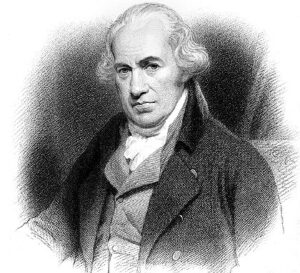The engine of my life was started in Greenock, Scotland in 1736. My father was a shipwright and I was the eldest of five children. I was home-schooled until I was 18, when I went to Glasgow to study natural philosophy at the University of Glasgow.
In 1765 I met John Roebuck, an inventor who was interested in the steam engine. Together, we developed a working prototype of a steam engine that used a separate condenser, which greatly improved its efficiency. I continued to work on the engine and in 1776 I patented the double acting engine, which became widely used in the textile industry.
I also worked with industrialist Matthew Boulton, and together we founded the firm Boult and Watt, which produced steam engines for a variety of industries. My work on improving the steam engine played a significant role in the Industrial Revolution, and nothing gave me more satisfaction than seeing how my machine outperformed human labor, which transformed the economy of Britain and the world.
One day, while I was working in my laboratory, I left a pot of a stew on top of one of my ovens by mistake. When I returned to check on it, I found that the stew had been cooking for so long that it had turned into an unrecognizable and unappetizing substance. I left frustrated and angry with myself for wasting the food, but my assistant managed to make me laugh by saying that the stew ‘needed a separate condenser,’ a playful reference to the innovation I had developed to improve the steam engine.
In addition to my work on the steam engine, I made many other scientific contributions throughout my life, including inventing a copying machine and developing a method for measuring the horsepower of an engine.
I married my cousin Margaret Miller in 1764 and we had two children. We also adopted a son, who became a well-known engineer in his own right. In my later years, I became interested in chemistry and spent much of my time working on experiments in my home laboratory.
Looking back on my life, I am proud of the contributions I made to science and industry and am greatly honored that the measurement unit of power – the watt- was named after me, and I would like to think that when I am gone, my name will remain in history for something more than the invention of the steam engine.
Abel C.
